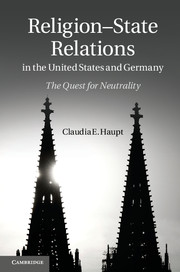6 - The roots of neutrality
from Part II - Religion–State Relations and the Role of Neutrality
Published online by Cambridge University Press: 05 January 2012
Summary
This chapter turns to the historical developments that led to the rise of neutrality, as illustrated by the review of case law of the US Supreme Court and the German Federal Constitutional Court in Chapter 4. The turn toward neutrality, a shared occurrence in the constitutional adjudication of the respective courts, must be historically contextualized. Contextualization illustrates that the underlying societal forces, in particular increasing religious pluralism, are somewhat similar and seemingly contributed to the ascent of neutrality. Moreover, the history and the philosophical foundations in the two countries, while often portrayed as diametrically opposed, seem to be more complex than conventional wisdom might suggest. Historical indeterminacy at the roots shapes both constitutional frameworks, and although it may have different sources, constitutional compromise is a shared phenomenon. The interrelation of church and state in Europe was largely undisputed for centuries, but subsequent constitutional developments based on a series of compromises caused significant indeterminacy in the German constitutional religion–state framework. The assertion that separation of church and state was at the basis of the American founding, or conversely the founding myth of the United States as a Christian nation, has always been ambiguous at best.
Founding discourses
As this discussion will demonstrate, one key insight is the indeterminacy of history at the time of the respective “foundings,” as well as their resulting limited significance for resolving contemporary constitutional issues. The “founding” in neither case was a singular event but rather the result of a long prior history. But this long prior history is subject to perspectival interpretation. An inquiry into the founding discourses, as we have seen, cannot give definitive answers to current constitutional questions. In the United States and Germany, an institutional division between church and state evolved over time; in both constitutional systems, a corresponding constitutional provision demands the separation of church and state. Determining the relationship between church and state first requires a distinction between the two. In central and western Europe, this distinction is a product of the modern period. Since the early Middle Ages, secular and religious forces repeatedly clashed over the organizational competences within the unified sphere of church and state. Key elements on the way to the functional separation of church and state are the end of religious unity with the emergence of different religious groups disputing each other’s legitimacy, and the rise of the modern state that asserted its legitimacy independent of a religious basis. The split, however, was not a singular event but historically developed over time; at different layers of the political order, moreover, it progressed at varying speeds. Take the German example. What did it mean for the Empire to stay out of the religious disagreement that resulted from the Protestant Reformation? What, on the other hand, was the result of the Empire’s position vis-à-vis those territories in which an established religion continued? Though these historical questions are fundamental to understanding the legal and cultural underpinnings of contemporary developments – perhaps most prominently in Germany the dual phenomena of secularization and pluralization – they cannot be solely determinative for resolving religion–state conflicts.
- Type
- Chapter
- Information
- Religion-State Relations in the United States and GermanyThe Quest for Neutrality, pp. 134 - 166Publisher: Cambridge University PressPrint publication year: 2011



